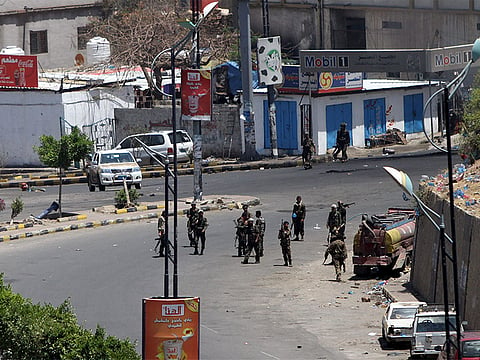Yemen expected to dominate Arab Summit in Egypt
Recent regional turmoil boosts an Egyptian proposal to create a pan-Arab force

Cairo: A Saudi-led military campaign targeting rebels in volatile Yemen has come to boost an Egyptian proposal to create a pan-Arab force to intervene in regional crises, experts have said.
The proposal is expected to be discussed at this weekend’s annual Arab summit in the Red Sea Egyptian town of Sharm Al Shaikh.
“In view of the unprecedented dangers facing the Arab world, the formation of this force has become necessary,” said Mamdouh Abdul Halim, a military expert.
“This force does not need to be enormous. It can be composed of well-trained military elements, who are given special tasks to carry out in times of trouble,” he told Gulf News. “The formation of this force can be based on the Joint Arab Defence Agreement,” Abdul Halim said, referring to a defence pact signed by the Arab League leaders in the 1950s. The accord has rarely been implemented.
In February, Egyptian President Abdul Fattah Al Sissi, a former defence minister, suggested the creation of a unified Arab force to counter regional militancy.
The proposal followed Egyptian air strikes against facilities of extremists in Egypt’s neighbor, Libya, after Daesh hardliners beheaded 21 Egyptian migrant workers there. Daesh has established a foothold in Syria and Iraq amid allegiance sworn to it by local jihadist groups in Libya and Egypt.
Cairo has announced “political and military” for the ongoing Saudi-led military operation against Al Houthis rebels in Yemen.
“Coordination is under way with Saudi Arabia and sisterly Arab Gulf countries on arrangements for participation with air and navy forces, and ground troops if necessary within the Arab coalition,” Egyptian Foreign Minister Sameh Shukri wrote on his Facebook page Thursday.
Yemen, which borders Saudi Arabia, is seen as an arena for Iran that backs Al Houthis.
Gulf countries have voiced worries about a possible nuclear deal between Iran and the US despite the latter’s attempts to reassure its Gulf allies.
Arab League chief Nabil Al Araby has said that the March 28-29 Arab summit will focus on “safeguarding Arab national security”.
Adopting the suggestion on setting up a pan-Arab defence force will depend on the summiteers, according to Al Araby.
A relevant agreement will not be easy, according to some experts.
“In theory, the Egyptian proposal sounds attractive because it will leave no room for foreign intervention in Arab crises. But in practice, it is hard to see an agreement on this in light of differences among Arab countries,” said Salah Al Hadi, a political science specialist.
“Despite the successive crises in the Arab world, the coming summit is unlikely to end inter-Arab differences and even mistrust. Some Arab countries have reservations that the creation of a joint Arab troop may be manipulated for achieving political gains and intervening in their affairs,” he added. “The Egyptian proposal may get backing from Gulf allies and Libya only.”
Gulf countries, expect for Qatar, have been diplomatic and financial backers of Egypt since the army’s 2013 overthrow of president Mohammad Mursi of the Muslim Brotherhood.
Libya has, meanwhile, descended into chaos in recent months as the oil-wealthy country is torn apart by two rival governments and parliaments as well as competing militias.
At least 13 Arab leaders, including those of Saudi Arabia, Kuwait, Bahrain, Qatar, Jordan and Tunisia, are expected to attend the summit in Egypt.



